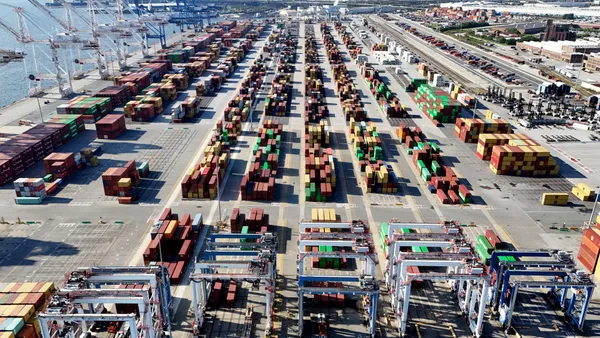Dive Brief:
- A.P. Moller-Maersk, along with BMW, H&M, Levi Strauss, Copenhagen University and others, formed a coalition to explore the use of "LEO" fuel for sustainable ocean shipping.
- LEO fuel is a blend of ethanol and lignin, a polymer found in plant cell walls.
- The project currently is in the lab development phase at Copenhagen University. Maersk said the next phase is testing fuel on vessels, which is slated for Q2 2020. The final phase will involve scaling up production of LEO fuel.
Dive Insight:
The development of LEO fuel is the latest in a series of moves by Maersk to reduce the shipping sector's emissions, which account for 2-3% of global carbon emissions, according to Maersk.
The container line's sustainability promise began several years ago, though perhaps most pivotal was the pledge to reach carbon neutrality by 2050 and a call for the industry to make carbon neutral vessels commercially viable by 2030 in order to meet the neutrality goal.
In addition to an expectation of corporate responsibility, regulations comprise much of the driving force behind sustainability initiatives in ocean freight. The Jan. 1, 2020 deadline from the International Maritime Organization requires all ships to comply with a sulfur emissions limit of 0.5% mass by mass, down from the current stipulations of 3.5%.
This year, Maersk joined the Global Industry Alliance to Support Low Carbon Shipping (GIA) and trialed carbon neutral biofuel, made from a blend of cooking and heavy oils. Biofuel produces 85% fewer emissions than bunker fuel. "LEO is meant to emit net zero emissions when introduced and hence 100% reduction," John Kornerup, Maersk's Chief Advisor for Climate Change, told Supply Chain Dive in an email.
The Danish carrier is also part of the Getting to Zero Coalition, which has outlined a four-phase roadmap for the shipping industry to cut down on emissions. The last phase, expected to occur from 2028 to 2030, envisions vessels powered by zero-carbon energy sources sailing on "key trade corridors."
The inclusion of shippers in the coalition on LEO fuel signals the importance to brands and retailers of reducing environmental impact from not only their own operations but their supply chain. "We ... are committed to reduce our impact in every aspect of our value chain, including how our products are shipped to consumers around the world," H&M COO Helena Helmersson said in a statement.
H&M was the first company to participate in Maersk's carbon neutral biofuel pilot, and it's also one of the members of the coalition exploring LEO fuel.
LEO fuel is still in the developmental phases, so it's too early to know if the fuel will results in higher rates or surcharges for shippers, Kornerup said. "It is widely agreed that from a cost perspective, sustainable fuels will be more expensive than fossil fuels," he said. "But we must always have into consideration the high price paid by society in relation to the indirect costs of CO2 emissions."













